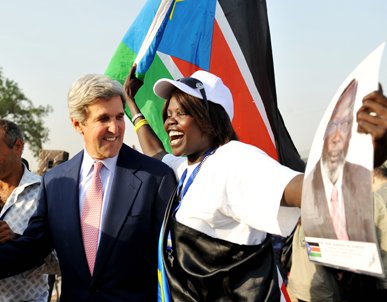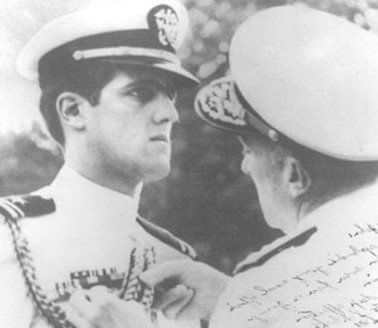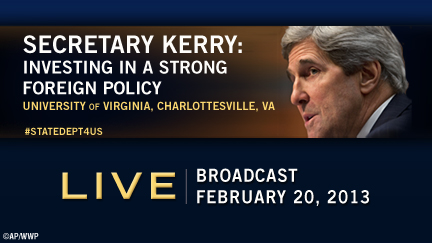New Secretary, Same Ole’ Game?
What Will Kerry’s Foreign Policy Bring To Africa?

New Secretary, Same Ole’ Game?
What Will Kerry’s Foreign Policy Bring To Africa?
It’s one thing when politicians talk blithely of the consequences of war and another to hear it from someone who has been in a combat position. If there is any politician who is aware of the cost of war, it is John Kerry.
During the Vietnam War, he had shrapnel pierce his left arm and left leg and was again wounded in his right arm when a mine detonated during an operation while fighting in the most controversial war in America’s history.

Much to his chagrin, the nightmare didn’t end there. Decades later, bullets in the form of words flew towards him during a campaign for presidency in the 2004 elections where he ultimately lost to incumbent George W. Bush. As the mudslinging in politics ramped up, illegitimate criticism to degrade his service in Vietnam were thrown at him to hammer a point about how he was a weaker candidate incapable of responding to terrorist threats. Ironically, Kerry now finds himself on a mission to clean up U.S.‘s foreign image marred by Bush’s war in Iraq, (which Kerry supported and then changed his mind) after the truth of erroneous claims of Weapons of Mass Distraction surfaced. A veteran who testified before the Senate Committee on Foreign Affairs referring to the Vietnam War as including “war crimes,” Kerry’s past, if anything, is a testament to his character.
How Will Kerry’s ‘Peace Mission’ Translate in Africa?
In February this year, Kerry was sworn in to replace Hillary Clinton, a trailblazer who has broken barriers as a woman and has become an assertive prominent figure in U.S.’s foreign policy, by announcing to work for peace. How will Kerry’s peace mission be different from what’s been done before? How will it translate in U.S.-Africa policy?

In his first speech at the University of Virginia in Charlottsville, Kerry mentioned issues related to the continent more than seven times. He talked about Africa as a place for business opportunities and future partnerships, a continent where the U.S. is weary of the threat of terrorism and at the same time a place where he will travel to exchange ideas and listen to the demands of its leaders. What was noticeable is this excerpt below:
“ In South Africa, where more than 600 U.S. companies are doing business, and where OPIC, the Export-Import Bank, and the Trade and Development Agency just opened an office to help close more investment deals between American companies and Africa’s booming energy and transportation sectors. It’s also a two-way street: a major South African energy company is planning to build a multibillion-dollar plant in Louisiana that will put more Americans to work. It’s happening in Cameroon and Bosnia and other surprising places, too. In the shadows of World War II, if you told someone that Japan and Germany would today be our fourth- and fifth-largest trading partners, they’d have thought you were crazy. Before Nixon’s bold opening with China, no one could’ve imagined that today it would be our second-largest trading partner – but that’s exactly what’s happened.”
The mention of the World War II era method could give observers possibly pivotal indication in what Kerry intends to accomplish during his term for several reasons. One fact is that despite being a continent with an increasing youth bulge, Africa has the highest number of aging leaders who mostly hold an ideology from the WWII time frame. Second and equally important is Kerry’s message to “re-engage” with countries, for instance Sudan.

After pushing for reform in Congress, Kerry embarked on a 3-day trip to Sudan in 2011 as the chairman of the U.S. Senate Foreign Relations Committee leading a congressional delegation. The message from the Obama administration to Khartoum, or to Omar Al-Bashir who is indicted for crimes against humanity by the International Criminal Court, was an offer to remove its label as the state sponsor of terrorism if it adheres with the agreements of the referendum of South Sudan.

What Kerry signaled is that U.S.’s engagement with dictatorships might be inevitable. The excerpt from his first speech to implement a Nixonian method in order to re-engage with countries that the U.S. has severed ties with is what’s new in a sense. Regardless of increasing military presence in the continent, Kerry’s “peace” mission highlights what Obama plans to accomplish in his second term: Push for collaboration with African nations for regional security and stress diplomatic ties by any means necessary, even if it means dealing with dictatorships. In his words:
“ deploying diplomats today is much cheaper than deploying troops tomorrow”










